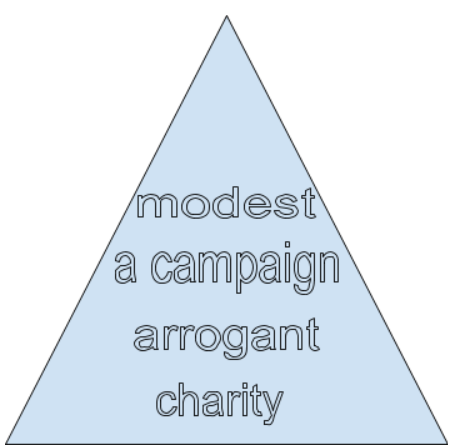
Image: Shutterstock
One of the most effective ways for young children to gain knowledge and develop crucial abilities is through play. So, if you’re in search of some fun and educational activities to do at home, word games for kids are the perfect option to keep your little one engaged. This game also makes learning at home enjoyable and lays the foundation for successful school learning. Moreover, word games assist your kid improve their vocabulary, spelling, grammar, writing, reading, verbal, and communication skills. Parents can study alongside their kids as children like having their parents participate in their learning. In this post, we present you with a list of fantastic word games that kids and adults may enjoy together. Read on.
Benefits Of Word Games
If you are wondering why word games for children are beneficial, here are some reasons:
- Develops vocabulary
- Improves fluency in the language
- Hones comprehension and reasoning skills
- Develops a love of words and reading
- Sparks their imagination and memory
- Improves their problem-solving skills
- Encourages creativity
- Serves as a great pastime for the family
- Stimulates the brain
- Improves concentration
There are many word games for kids that help them learn new words. These games are entertaining and educational, making them enjoyable for everyone involved.
We have listed the 20 best word games for kids. These games will ensure you and your children have a great time learning new words.
1. Hangman

Image: Shutterstock
Hangman is a fun paper and pencil guessing word game for kids that can be played between two players. More players can participate and take turns as well. It is a simple game where a stickman is hanged if a player fails to get the word right.
Age group: 6 to 10 years
No of players: 2
How to play:
- Take a sheet of paper and a pen and draw gallows.
- The first player thinks of a word and draws dashes above the gallows equal to the number of letters in the word.
- The other player starts guessing the letters one by one.
- If the letter the player says is in the word, the first player writes it in the corresponding spaces on the dashes.
- If the letter is not in the word, the first player draws one part of the stickman, starting from the head and followed by the body, hands, and legs.
- If the stickman gets completed before the second player guesses the word, that player loses.
- Switch sides and start again.
- Proper nouns or slang words are not allowed.
2. Name the animal
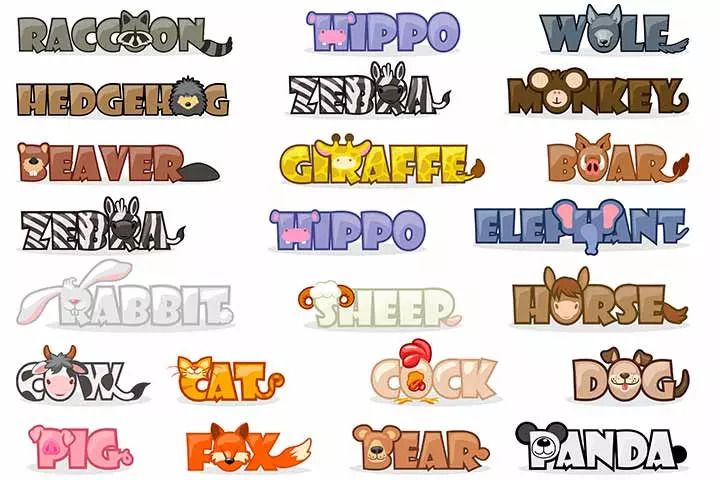
Image: Shutterstock
Name the animal is a multiplayer kids word game that can help teach your children animal names and improve their reasoning skills. This game also offers your child the opportunity to exercise their lateral thinking skills.
Age group: 4 to 7 years
No of players: 2 or more
How to play:
- You can be the host of the game.
- Make a list of common animals and a list of words that rhyme with these animal names.
- Call out each player and present them a rhyming word, and let them guess the animal name. You can say things like, “I rhyme with fog. I am a …..”
- The player who gets the maximum words correct is the winner.
- You can also teach them animal sounds by substituting animal names with their sounds.
3. I spy

Image: Shutterstock
I spy is one of the easiest games of the lot. All you need is your imagination and some eager players.
Age group: 4 to 6 years
No of players: 2 or more
How to play:
- Locate an object, and tell your child its first letter saying, “I Spy an object starting with the letter ….”
- Your child looks around and recognizes each object corresponding to that letter.
- Stop when they get it right and continue the game with the next player.
- You can also mention the color or shape of the object and let your child guess it correctly.
4. Make a word
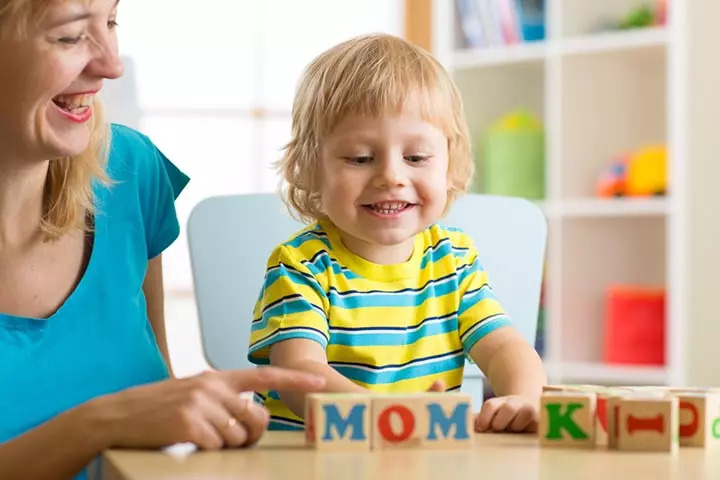
Image: Shutterstock
If your child is starting to learn new words, this word game for kids is useful. You can also play this game with older kids to make them learn difficult words and improve their memory. This game lays a solid foundation for playing advanced spelling games, such as Scrabble.
Age group: 4 to 12 years
No of players: 2 or more
How to play:
- You can play this game with younger children if you have magnetic letters, plastic letters, letter mats, or letter blocks.
- Give them a set of letters and ask them to make two- or three-letter words with them.
- For older children, you can play the game mentally or write a set of letters on a piece of paper and ask them to make as many words as they can from them.
- You can even play a timed version of the game with older children as they enjoy a good challenge.
5. Rhyming words
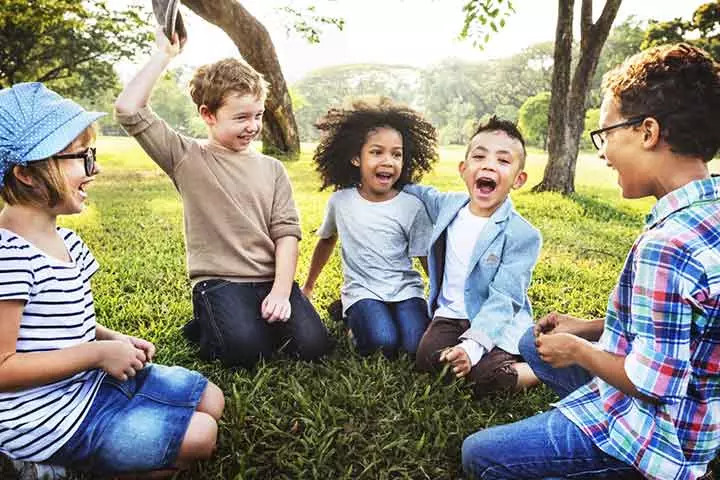
Image: Shutterstock
Rhyming Words game is a variation of Name the Animal. This word game for kids encourages your child to learn new words and helps hone their reasoning skills.
Age group: For ages 3 to 6 years
No of players: 2 or more
How to play:
- Name any animal.
- Ask your children to say the words that rhyme with the name of the animal, in turns.
- For example, when you say the word “dog,”your children should come up with words such as fog, hog, and log.
- Continue with a player until they run out of words and repeat the game with the next player.
6. Name, place, animal, thing
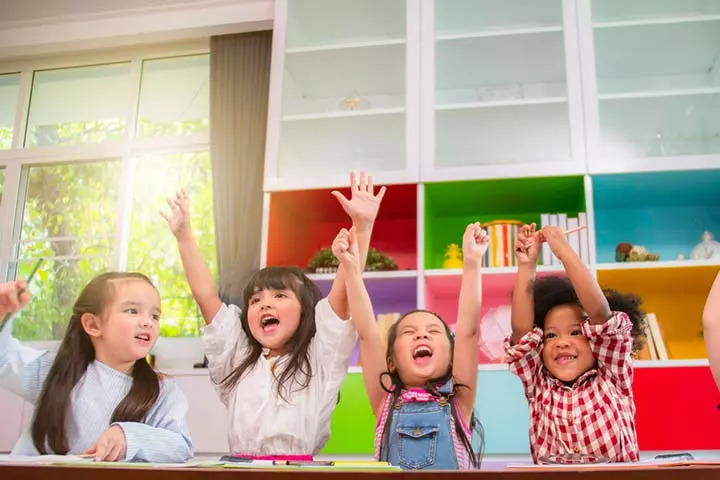
Image: IStock
You might remember playing this game as a child yourself. This game helps in expanding your child’s knowledge and memory.
Age group: 5 years and above
No of players: 2 or more
How to play:
- Give each player a sheet of paper and a pencil.
- Say a letter of the alphabet and start a timer.
- Each player must write the words of a name, place, animal, or a thing starting with that letter. For example, if the letter is A, a player may write, “Alex, Australia, Ape, Apple,” under each of these categories, respectively.
- You can assign different letters to different players or the same letter to each one.
- You can include other categories as per your convenience.
7. Hink pink
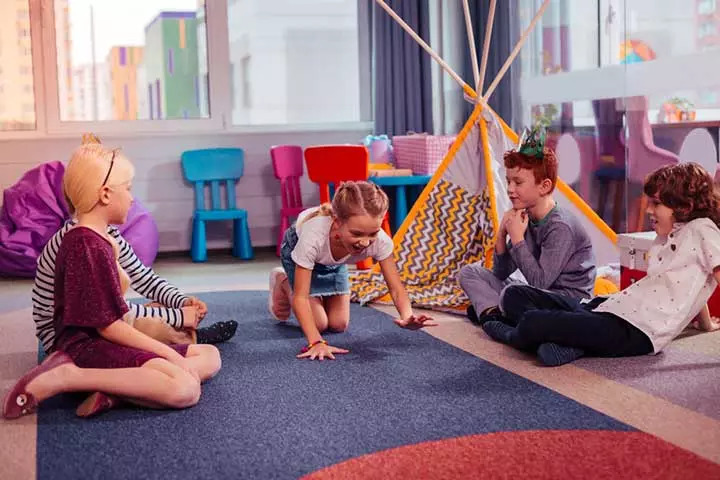
Image: Shutterstock
Children love this game. This word game for kids is designed to maximize fun while learning new words and their meanings. The game can help improve your child’s ability to solve crossword puzzles and cryptic crosswords.
Age group: 4 to 12 years
No of players: 2 or more
How to play:
- Ask each player to come up with a set of rhyming monosyllabic words, e.g., fat rat.
- Help them make a clue about their words. In this case, the clue will be “a rodent that is not thin.”
- Each player says their clue aloud, and the others try to guess what the rhyming words are.
- If the children are older, you can play Hinky Pinky (two-syllable words) or Hinketty Pinketty (three-syllable words). You can even make different combinations between different syllabic words.
- Ask the children to act out the words too so that all of you have lots of fun while the children learn difficult words.
- Here are some more words to get you started: Thin Pin, Big Pig, Tan Pan, Fan Man.
8. Guess the correct word
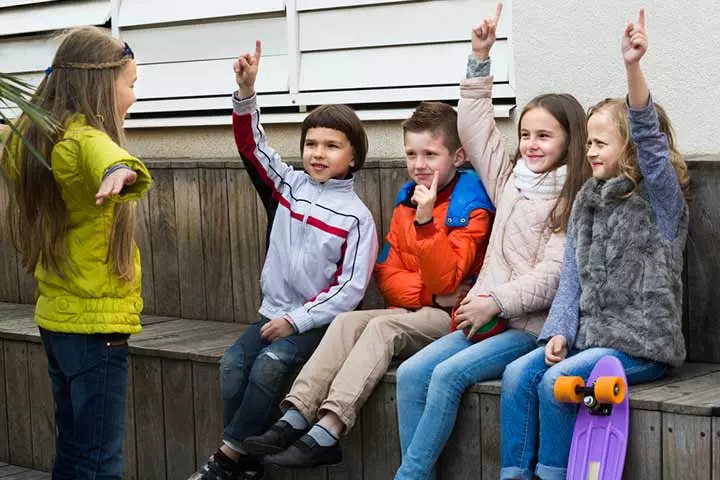
Image: Shutterstock
This word game for kids, if played mentally, is an excellent way to boost your child’s memory. It is a simple game and can be played with pencil and paper if you want to keep score.
Age group: 6 years and above
No of players: 2 or more
How to play:
- The first player thinks of a word and announces its first letter and the number of letters in the word to the others. If the player has thought of the word “Bananas,” they should say B and 6.
- The other players have to guess the word using these clues.
- If a player says another word but it has some matching words with the original word, the first player will say that the word is wrong but there are matching letters in the correct places or the wrong places.
- The next player uses these clues to make the next guess.
- You can keep the words simple or difficult according to the age of the children.
- As for the example of Bananas:
Player 2: Bullock
Player 1: That is incorrect
Player 3: Bahamas
Player 1: That is incorrect, but the As are in the correct place,
and so on.
9. Word hunting
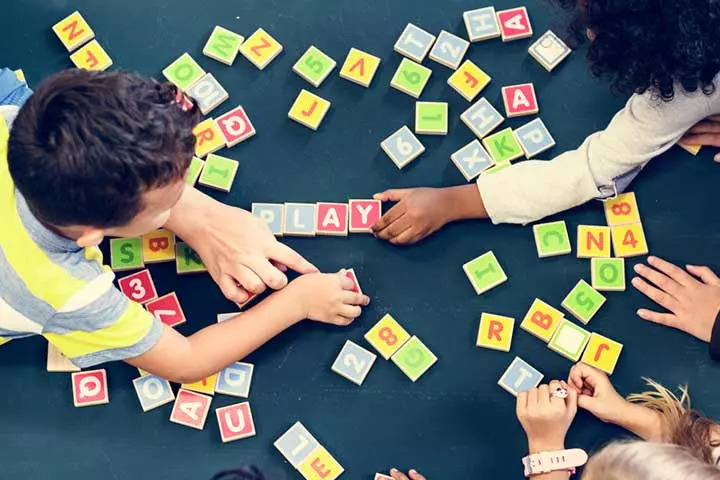
Image: Shutterstock
If your child is just learning the alphabet, this is an easy game to play. However, you can make some minor changes and tweak it for older children.
Age group: 4 to 7 years
No of players: 2 or more
How to play:
- Scatter magnetic letters, plastic letters, or letter blocks on a table.
- Ask your child to pick up a letter from the lot.
- For older children, you can write three- or four-letter words on little chits of paper and do the same procedure as above.
- For children who can read, you can ask them to pick words they see outside shops, etc.
10. Change one letter
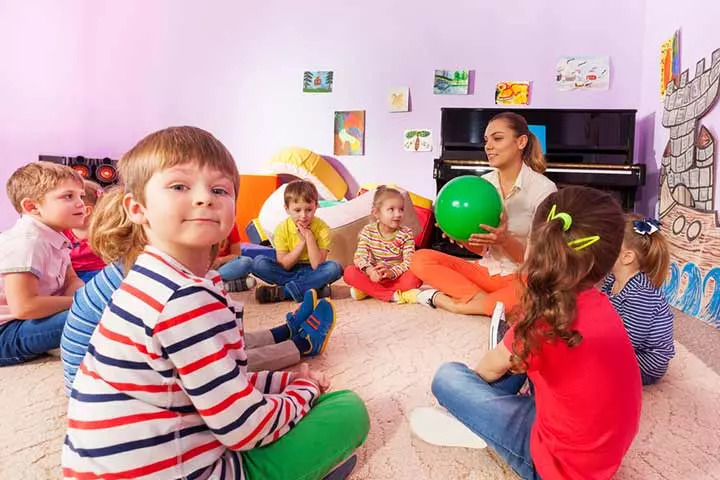
Image: Shutterstock
This is a great word game for school children. The game promotes out-of-the-box thinking and allows your child to come up with new words and even their meanings.
Age group: 5 to 10 years
No of players: 4 or more
How to play:
- Begin with a short word that has three, four, or five letters (according to the age of the children).
- Ask the children to take turns in calling out new words by changing just one letter of the previous word. E.g., park – part – dart – dark / mark – mare – mart / cart – care – case – cast – mast (and so on).
- You can set a timer or divide the players into teams to make the game more exciting.
11. Call my bluff
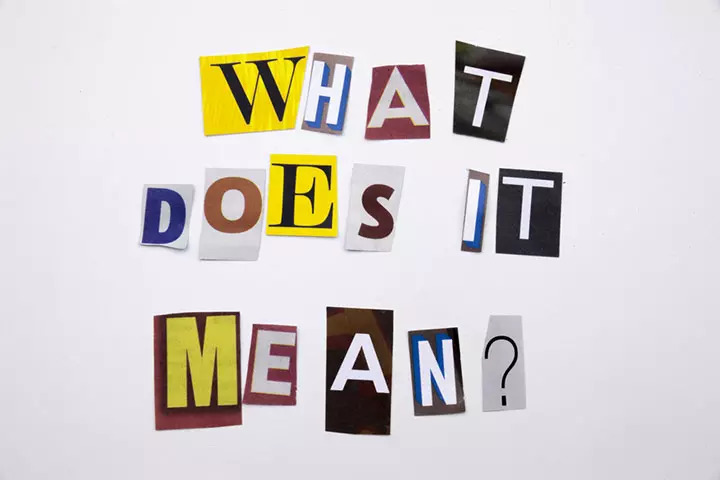
Image: Shutterstock
Call my bluff is commonly played at sleepovers and during picnics and is an excellent word game for older children.
Age group: 8 years and above
No of players: 4 or more
How to play:
- Divide the children into teams.
- Give them a set of words that are common but unfamiliar to them.
- Ask each team to look up the meaning of each word, and make up two wrong meanings for each word.
- Each team asks the other team the meaning of a word and gives them the three options.
- If the opposite team guesses the correct meaning, they get points. If they don’t, the team that asked the meaning gets the point.
- For example, let us take the word “Bewildered.” You can give three choices (a) to be left in the wild, (b) shocked or surprised, and (c) out-of-control behavior.
12. Unscramble the words
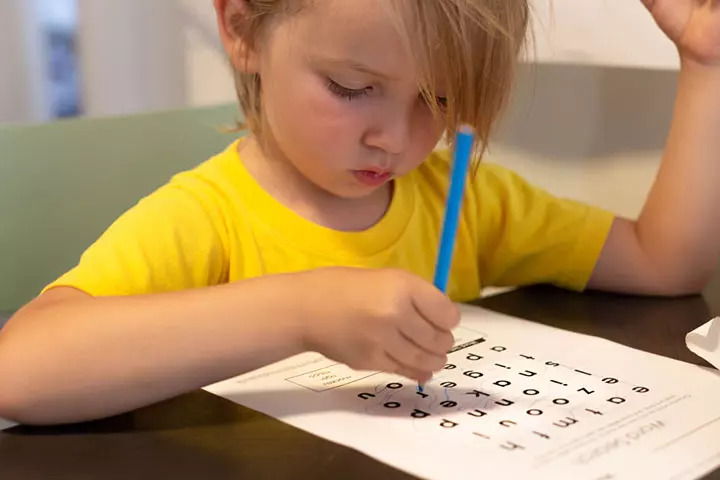
Image: Shutterstock
Let your children put on their thinking caps and play this game. The word game makes your child think and helps stir their imagination and improve their reasoning skills.
Age group: 5 years and above
No of players: 2 or more
How to play:
- Think of a word and write it down on paper but in a scrambled form.
- Your child has to think and arrange the word in the right sequence.
- You could even give clues so that they can unscramble the word faster.
- You could also write down a set of scrambled words, set the timer, and ask them to solve as many as they can within the allotted time.
13. Tell me a story
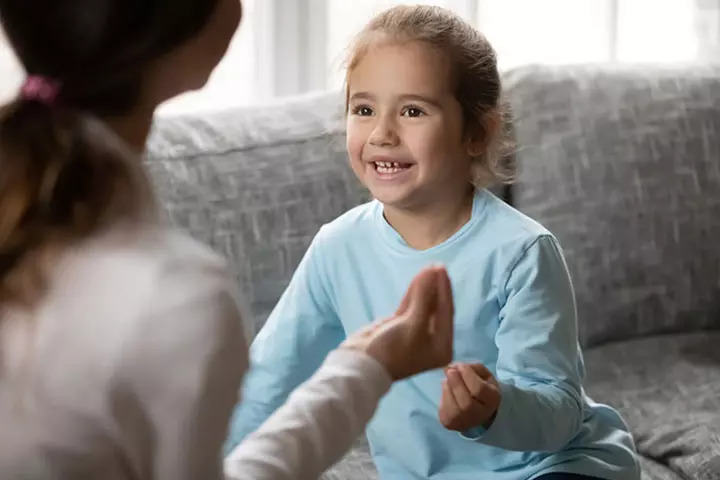
Image: Shutterstock
Children are incredibly imaginative. Children, as young as three years old, start making imaginary stories. You can play this game to fire your child’s imagination.
Age group: 5 years and above
No of players: 2 or more
How to play:
- Start a “story” with a sentence.
- The next player should say another sentence and continue the story.
- As the story grows, it becomes hilarious and absurd.
- For example, you start with the sentence, “In a village, there was a man named Joe.” The next player can say, “He wore a red shirt every day,” and the next player may say, “One day, a bull charged at him,” and so on.
14. Words in a word
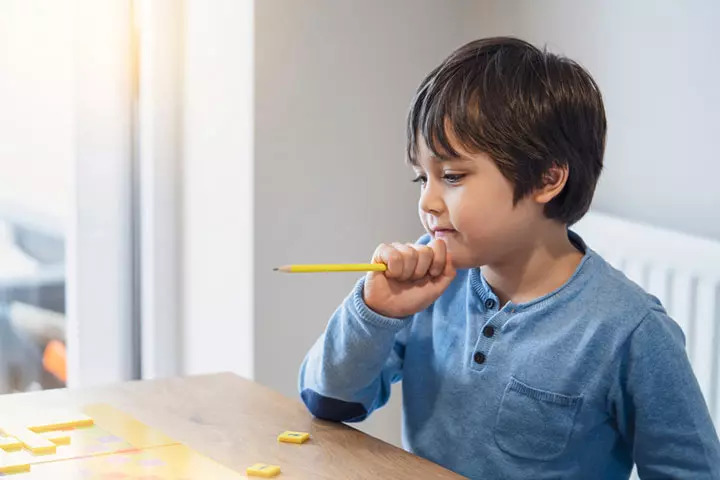
Image: Shutterstock
This is one of the most popular word games for kids and one of the best word-building games of all time. It is useful in improving your child’s English, if it is not your native language. You might have played this game in your childhood. It is now your children’s turn to play the game and keep the tradition alive.
Age group: 5 years and above
No of players: 2 or more
How to play:
- Think of a long word. A popular word choice for this game is “Constantinople.”
- Ask your child to write words starting with each letter in the word. They should use the letters contained in the word only.
- For example, Constantinople can have words such as con, cot, on, oil, no, nap, sit, and sip.
- You can set a timer and ask your child to write down as many words as they can within the given time frame.
15. I’m going on a picnic
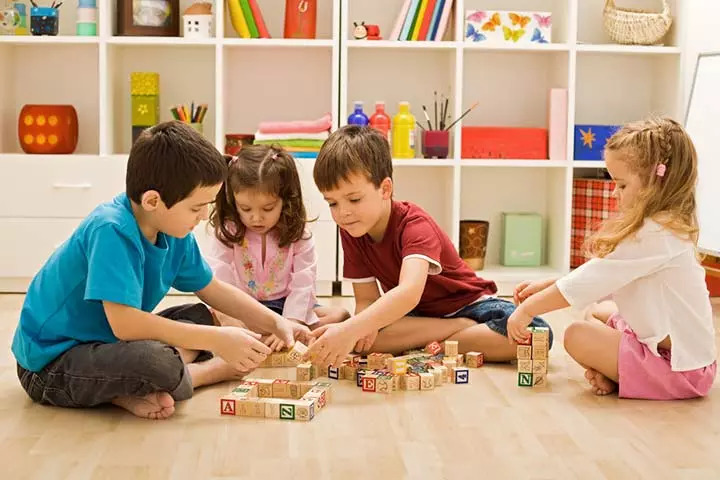
Image: Shutterstock
This game is for older children. It helps hone their creative skills and improves their memory. The word game is usually played in classrooms, but they can play it at a sleepover or even with you as a family game.
Age group: 5 years and above
No of players: 3 or more
How to play:
- The first player starts by saying, “I’m going on a picnic, and I will bring a ….”.
- The next player adds an item to the list and repeats the words.
- Each player has to repeat the items named in the exact sequence.
- If a player forgets a name or the sequence, they are out of the game.
- You can either start the game all over again or ask the next player to pick up the sequence and continue.
- For example, the game goes as follows:
Player 1: I’m going on a picnic, and I will bring a cookie.
Player 2: I’m going on a picnic, and I will bring a cookie and a Popsicle.
Player 3: I’m going on a picnic, and I will bring a cookie and a Popsicle and a bottle of juice, and so on.
16. Crosswords
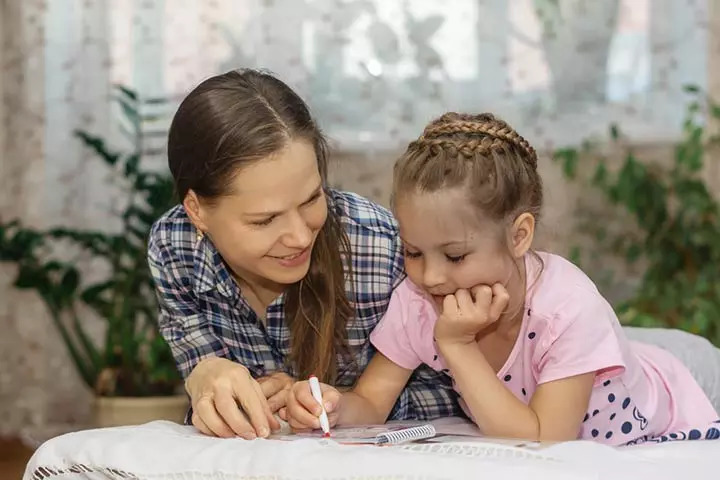
Image: Shutterstock
Solving crosswords requires practice and a lot of patience. The game will not only teach your children new words but also develop their deductive reasoning skills to a great degree.
Age group: 6 years and above
No of players: 1
How to play:
- Draw a grid with white and black squares and number each row and column.
- Then, write a set of clues at the bottom of the grid with the corresponding row or column number.
- Ask your child to solve the crossword.
- You can set a timer to make the game challenging.
- You can get some printable crosswords with clues easily on the Internet (you will find some free and printable crosswords in this link). Crosswords regularly appear in newspapers and magazines.
17. Word quest
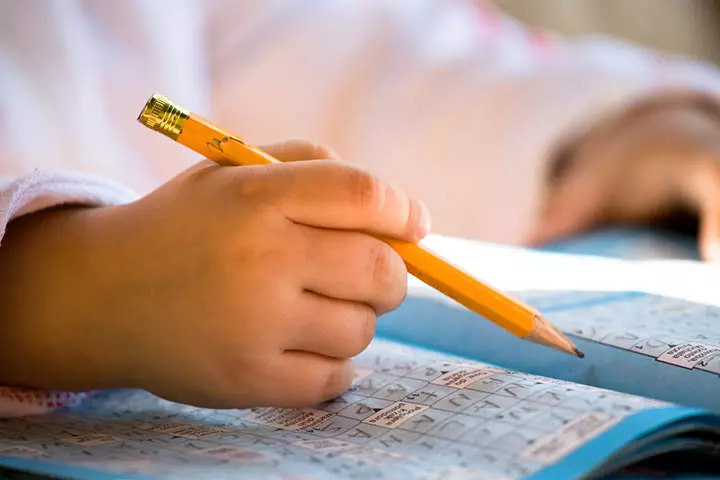
Image: IStock
Word quest is a word game for older kids. The game involves searching for words using single letters and makes your children use their deduction skills.
Age group: 5 years and above
No of players: 2 or more
How to play:
- Draw a 10×10 or 12×12 grid on a sheet of paper and divide it into squares.
- Write various words below and to the side of the grid.
- Write random letters in random squares.
- Ask your child to fill in the grid using the words you have written outside the grid.
18. Consequences
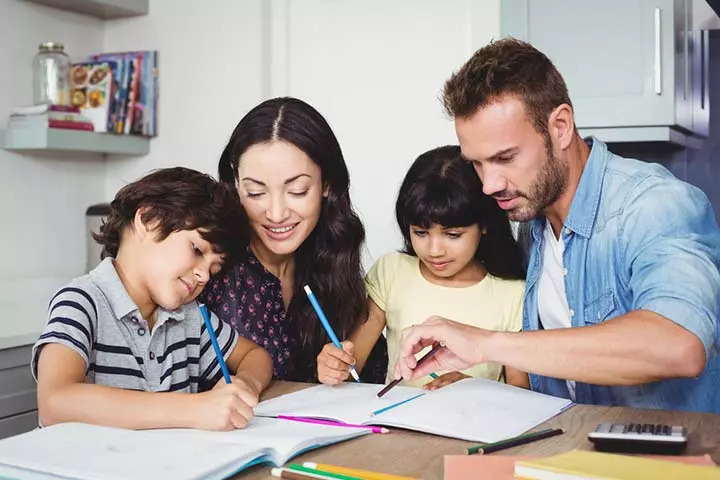
Image: Shutterstock
This word game helps stir the imagination and encourages creativity. The game works well with both children and adults.
Age group: 5 years and above
No of players: 2 or more
How to play:
- The first player writes down a sentence on a sheet of paper and passes it on to the next player.
- The next player writes the next sentence and passes it on.
- Once all the players are done with adding their sentences, you can read out the story.
- You can also write 4–5 sentences with open endings on a sheet of paper and hand them over to each player. Each player writes their version of the story and reads it aloud at the end of the game.
- For example, you can write, “There was a man named …….. He …………. a woman named ……………. They went to …………. He said, “…………………” She said, “……………………” And then, ……………..” and so on.
19. Scrabble
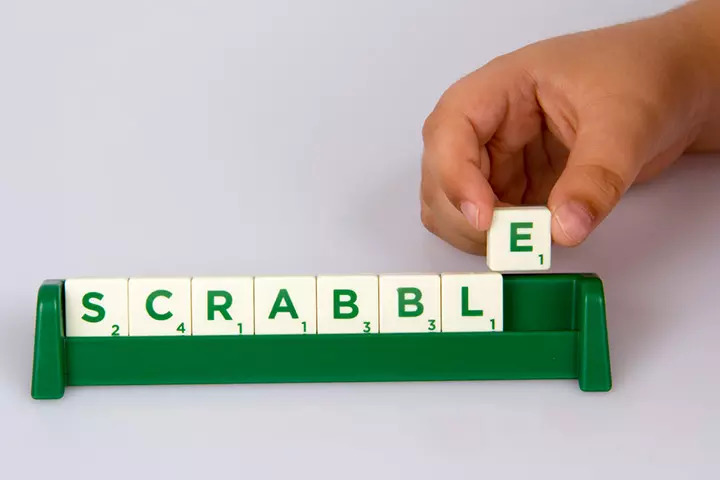
Image: IStock
Scrabble is a popular classic word game for kids. If you want your child to learn new words, this is one of the best games.
Age group: 6 years and above
No of players: 2 or more
How to play:
- Get a scrabble boards.
- Set it up and read the rules.
- The number on each letter tile tells you how many points it’s worth, and the squares on the board tell you how many points you scored.
- The player who gets the maximum score is the winner.
- After a game of Scrabble gets over, the board looks similar to a crossword.
20. Pass the bomb
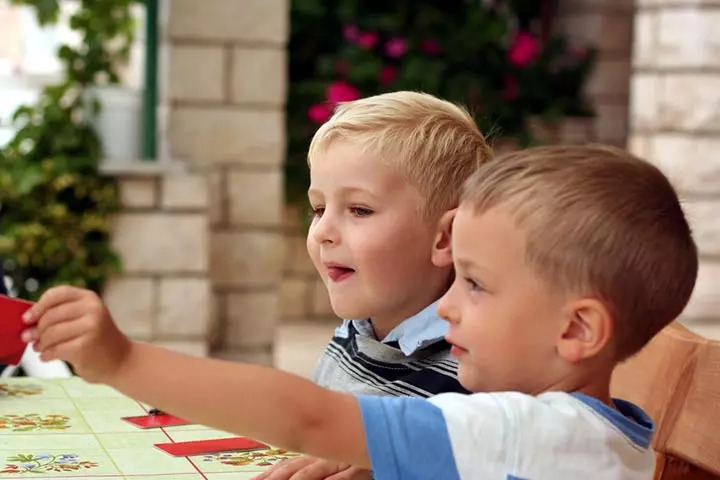
Image: Shutterstock
Pass the bomb is an educational game that will test your child’s alacrity. The first player should say a word and pass the bomb as quickly as possible to the next player, who must say a similar-sounding word. The players need to be quick in passing the bomb before it explodes. You can get this board game at a shop or simply make your own set.
Age group: 5 years and above
No of players: 2 or more
How to play:
- Take a set of card papers and write two- and three-letter words on them with a marker.
- The first player picks up a card and passes it around.
- The “bomb” goes off after a certain time. If you have made the cards at home, you can use a timer or even play music.
- The moment the timer goes off (or the music stops), the player holding the card is out.
- However, before leaving, they have to say a word that contains the word written on the card.
- For example, if the card has “ART” written on it, the child who gets out can say a word with ART in it, such as part, mart, or cart.
1. How can word games help children improve their spelling skills?
When children engage in word games, they are required to focus on the spelling of various words, which helps them to learn and remember the correct spelling of those words.
2. In what ways can word games help children with their grammar?
Word games encourage children to think about language playfully and engagingly, making it easier to understand and remember grammar rules. Word games can also help expand children’s vocabulary, an essential component of good grammar. By learning new words and their meanings, children can improve their ability to express themselves clearly and accurately.
3. How can word games help children improve their vocabulary?
Word games are an excellent way to improve children’s vocabulary skills, as they help them learn new words and reinforce their understanding of familiar ones. Games such as Scrabble, Boggle, and crossword puzzles challenge children to think critically and creatively about words, requiring them to use problem-solving skills to develop new words and find hidden ones.
4. How can word games help children become better readers?
Word games can help children become better readers by improving their vocabulary, spelling, and comprehension skills. Such games require children to identify and create words, helping them to recognize new words and understand their meanings. This eventually improves their reading skills.
When education is imparted as activities and games, children tend to grasp it much faster and retain it longer. So, if you want your children to have great communication skills, fluent vocabulary, and fascinating imagination, involve them in word games for kids. Games, such as I spy, make a word, or hink pink, are effective in keeping children engaged and sharpening their grammar and vocabulary. Another good thing about these games is that you can be involved in playing too. So, choose a suitable word game according to your child’s age and have fun while playing.
Key Pointers
- Word games stimulate the brain to improve reasoning skills, vocabulary, and language skills.
- Spur creativity through games such as I spy, rhyming words, and hink pink.
- Test the memory with games such as guess the correct word and make a word.
Was this article helpful?
The following two tabs change content below.
- Reviewer
- Author
Learning new words and phrases is essential when studying a foreign language. It is thanks to upgrading our word-stock that we become a more competent speaker of the target language. As teachers, we need to ensure our students feel comfortable using the new words/word combinations by providing enough practice for them. Hence, vocabulary should be one of our primary concerns.
Practice has shown that there are 3 ways of helping our brain to remember new information and assimilate it thoroughly — when what we are doing is fun and enjoyable, when we can make associations, and when we put it into immediate practice in real-life situations. Games can do it.
Some might argue that using games with children/teenage learners, might lead to poor classroom management and be very ineffective. Others might say, that using games with adults is too childish and will not benefit the learning process. The reality is that everyone enjoys games, fun, entertainment and it is the teacher’s job to ensure that it serves its purpose as well.
Below are some games that have surely worked with most classrooms, mine included.
Sticky notes

These are also known as post-it notes. Things that can easily be found in every classroom. They are fun to use to recycle vocabulary and can be exploited in very different ways. Here is one of the ways.
After you have covered some vocabulary, take the post-it notes and write one word on each. Depending on the number of your students, make sure each of your students gets at least 2 words. You can stick them on the desk, on the wall, wherever comfortable.
Ask the students to take a word/words, check whether they remember the word or not. If not, they can consult their dictionaries at this point. Tell the students not to show their words to each other. Ask them to work in pairs/groups and explain their words to each other without using the root of the word. When the students are done explaining and the words are guessed, ask them to exchange their words. Now they need to move to another pair and explain the new words they have received from the previous partner.
This can go on for 3 rounds at least. By the end of the activity, each student will have had the chance to explain a lot of words. As we know students learn from each other much faster and this activity covers a lot of target phrases at once.
Alias
This game has become very popular not just in friendly gatherings but also in language classes. A great way to recycle vocabulary in a playful way.
Create word cards that you want the students to revise (5-7) words on each. Set the students into pairs/groups. Each person from the pair/group will have 2 minutes to explain the words on their cards. When the time is up the turn passes to the next player and the remaining words are left for the second lap. This can go on for about 10-12 minutes until the students have managed to explain most of the words. When the time is up, the words that were left unguessed/unexplained can be boarded and dealt with open class. Most probably those are the words that present some difficulty for the students.
Pyramids

‘Pyramids’ is quite similar to Alias, however, students here score different points based on the complexity of the word at hand.
Before the class prepare a list of the words you want to revise and put it in the shape of a triangle.
Add as many words as you wish, though from my experience 6 works the best. The word at the top is considered to be the most difficult one, hence worth more points. In my case, it is 4 points. Consequently, the last word is the easiest one and is worth 1 point.
Split the students into pairs and give each of them a couple of pyramids. Time them for 5 minutes and ask them to define the words on their pyramid for one another without using any roots or translations. The person who scores more points wins.
This is a quite competitive game and the students are always trying to get the top words.
Stop the bus

This is also known as ‘hot-seat’. This is a very competitive game and can get quite loud.
Divide the students into 2 teams. Ask one member from each team to sit with their back to the board while the rest of their team sits close to that person. Write a word you want to revise on the board. The students who are facing the board will need to define it. As soon as the student with his/her back to the board guesses it, they shout “stop the bus” and the game stops. If the guessed word was correct, the team scores a point, if not — the other team gets the chance to tell their option.
It is a great energizer and can normally be used at the end of the class to shake the students off a bit and see them off on a fun note.
Battleship
This is played in the same way as the famous battleship game we were playing as kids. Draw a grid 10×10. Ask the students to write down words/phrases from the vocabulary list in random order. Set students in pairs and ask them to try to find the grids where the opponent has put a word by naming the square they want to check (e.g. A8). If the mentioned square contains a word, the player says “hit” and defines the word for the opponent. If the opponent guesses the word he/she scores a point. This helps to practice definitions a lot.

Below is a sample grid.
Class story
This is a great activity if we want to practice sentence structure, paragraph/essay structure using the target vocabulary. Set students in pairs, deliver the list of the words you want them to use in the story. It is fun to distribute the words on post-it notes. Ask students to write a short story using the words at hand and give a title to it.
Next, you can ask the students to post their stories on the walls and read each other’s stories by walking around the class. They will need to tick the story they like the best and the one with most ticks wins. The winning one will be read open class.
Alternatively, before setting up the writing task, you can brainstorm any words/phrases that students remember from the sessions and put them on board. The words can be very random. This will make it a bit more challenging to connect all the words in one story, however, this normally gives a round of good laughs in the end.
This activity is great to practice writing/spelling skills at the same time.
Talk for 2 minutes

This activity aims both at recycling vocabulary, putting it into practice, and has a fluency focus.
Here is how it can be done. Divide the students into 2 groups. Ask them to write down the names of the studied topics, e.g. “technology, finance, holidays”, etc. It’s best to have at least 6 topics, so that the students will have something to choose from. Ask the students to choose 3-4 topics they would like to talk about with their team. Once the students have chosen the topics, ask them to look through their vocabulary and find at least 5 words each that can be used while discussing the topics. When the students are ready, time them for 2 minutes to discuss the first topic inside their team by using the chosen words. As soon as time is up, pass to the next topic.
Choose 3 words
I have been using this technique recently and the students seem very determined and motivated.
Ask the students to choose 3 words for each class from the vocabulary covered during the previous classes, bring them to class on post-it notes and stick them on the desk. The students’ goal will be to use those words during the class any time possible — when asking a question, when having a discussion, etc. Not all the words might get the chance to be used, however, the students will keep on looking for an appropriate context to use it in.
This is a great activity to make sure the students know in which context and situation the target word/phrase is used in.
Pictionary
If you want to get more creative and have some motion in class, then this is definitely a game to try.
Split the students into 2 or 3 groups depending on the number of your group. Divide the board into respective sections. Let the groups choose one person from their team who will be drawing. Pick a word or a phrase from the vocabulary list which the drawers will need to draw for their team to guess. They cannot use any words while drawing. Time the students for 1 minute to draw the chosen word/phrase. All the groups draw and guess simultaneously. The group that guesses the word first, wins. If the time is up and no one wins, reveal the word.
This activity can be adapted to all levels, starting from A1 (e.g. table) to C1 (e.g. have a lot on your plate)
Make questions with the target words
This is a task that saves a lot of preparation time and effort on the part of the teacher. At the same time, it helps the students to have more exposure to the target language.
Deliver a list of words you want to be revised. Ask the students to create questions using those words. To ensure the questions will trigger discussion, demo the first one.
Let’s say you want to use the word “charity” to make a question. Ask the students to come up with a good (open-ended), bad (Yes/No) question.
E.g.
- Why do you think people do charity? (open-ended)
- Do you like doing charity? (Yes/No)
Divide the students into groups and ask them to make questions which will be open-ended and ignite discussion. In the meantime, monitor to see if the students are doing it right. Help them out when necessary.
Once the questions are ready, ask the students to swap the questions with the other group and comment on them inside their team. Encourage the students to use the target word in their answer and come up with more details and explanations.
E.g.
- I think people to charity because they want to help others in need. It is always nice to do something for people if you can afford it.
This activity helps to practice not only target words and phrases, but also sentence structure and word order in questions.
Entry/exit tickets
Students are known to learn with patterns. Exit and entry tickets provide a good entrance and summary for the class.
I normally put some sticky notes on my classroom door with the word I want them to define. When students arrive for class, they need to define the word for the rest of the group and then take their seat.
As for the exit tickets, they work perfectly well after vocabulary sessions when you want the students to remember certain words and phrases before they leave the classroom. You will choose these words depending on the covered material and the words/phrases students have had difficulty with.
Doing this for a couple of sessions develops behaviour and gives the students a chance to see their progress and summarize the language covered during the classes.
Running dictation

This is another fun and active recycling activity. It will get the class moving, exercise their memories and spelling skills.
Before class, prepare some definitions for the words that you want to revise. Post the definitions in the room, in different random places.
During the class split the students into pairs. Let them decide who will be the runner and who will be the writer. Once the students have chosen their roles, give the writers the list of the words which definitions you have posted on the walls. As for the runners, ask them to run, read a definition from the wall, come back and dictate it to the writer. The key here is to remember the definition word by word, no improvisation allowed. While the runners are dictating the definition, the writers need to find the right word for it and put the definition next to it.
This activity helps the students to memorize the right definitions/explanations for a word/phrase as the runners will have to go back and forth to remember the definitions correctly. The writers will have the same exposure, however, they will also practice the spelling of the words.
This is a great energizer and gets the students’ competitive mood up.
Board race
This one is a great starter for the vocabulary revision sessions. Let’s say you have covered the topic of ‘transport’ and want to revise what means of transport students can remember.
Board ‘transport’, split the students into 2 teams and line them up to the board, so that they are standing one after another. Tell the students that they will have 2 minutes to write down as many words connected with the topic as they can. The rule is that the first person writes the first word, goes back, gives the marker to the person standing next to him/her and only after receiving the market this person can race to the board and write the next word. Encourage the students to do it as fast as possible.
When the time is up, compare the two lists the teams have come up with and cross out the same words that happen in both lists. The team with the most words left wins.
This activity also gets very competitive no matter what age group you are working with.
Jan 15, 2022 It’s an exciting time when your child first begins to speak. Saying their first words is a major milestone. It paves the way to the development of speech and language and better communication between you and your child.
- Combine Words and Make Sentences with Speech Blubs
- Is Your Child Ready to Combine Words?
- Use a Variety of Words
- Express Two Ideas
- Here’s How You Can Help
- Expansion
- Gesture
- Choices
- Emphasis
- Hang in there!
- Modeling
- Simple Sentences
- Repetition
- Some Fun Activities to Get You Started
- . . . and here are even more!
In order for this communication to develop, your child needs to be able to say individual words to build up their vocabulary. It’s only once children have done this that they can begin to combine words together. This is where the real communication begins!
Combine Words and Make Sentences with Speech Blubs
Speech Blubs is a fantastic speech therapy app with more than 1,500 activities, face filters, voice-activated activities, and educational bonus videos. Explore our “Build a Sentence” section and watch your child learn right away!
Boost Your Child’s Speech Development!
Improve language & communication skills with fun learning!
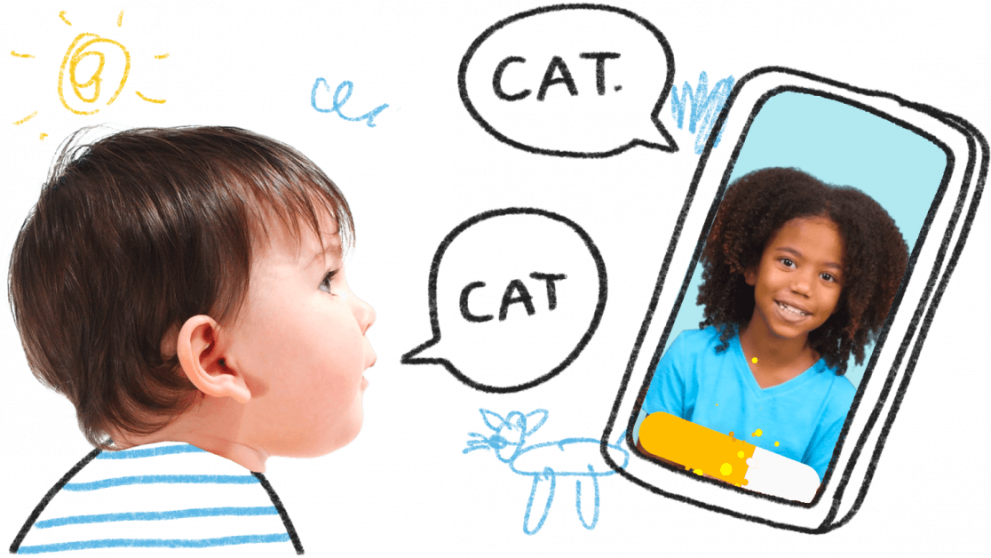
Is Your Child Ready to Combine Words?
Your child should start joining two words together or using ‘telegraphic speech,’ by the age of 18-24 months. But in order for your child to combine words, they first need to understand and recall what certain words mean.
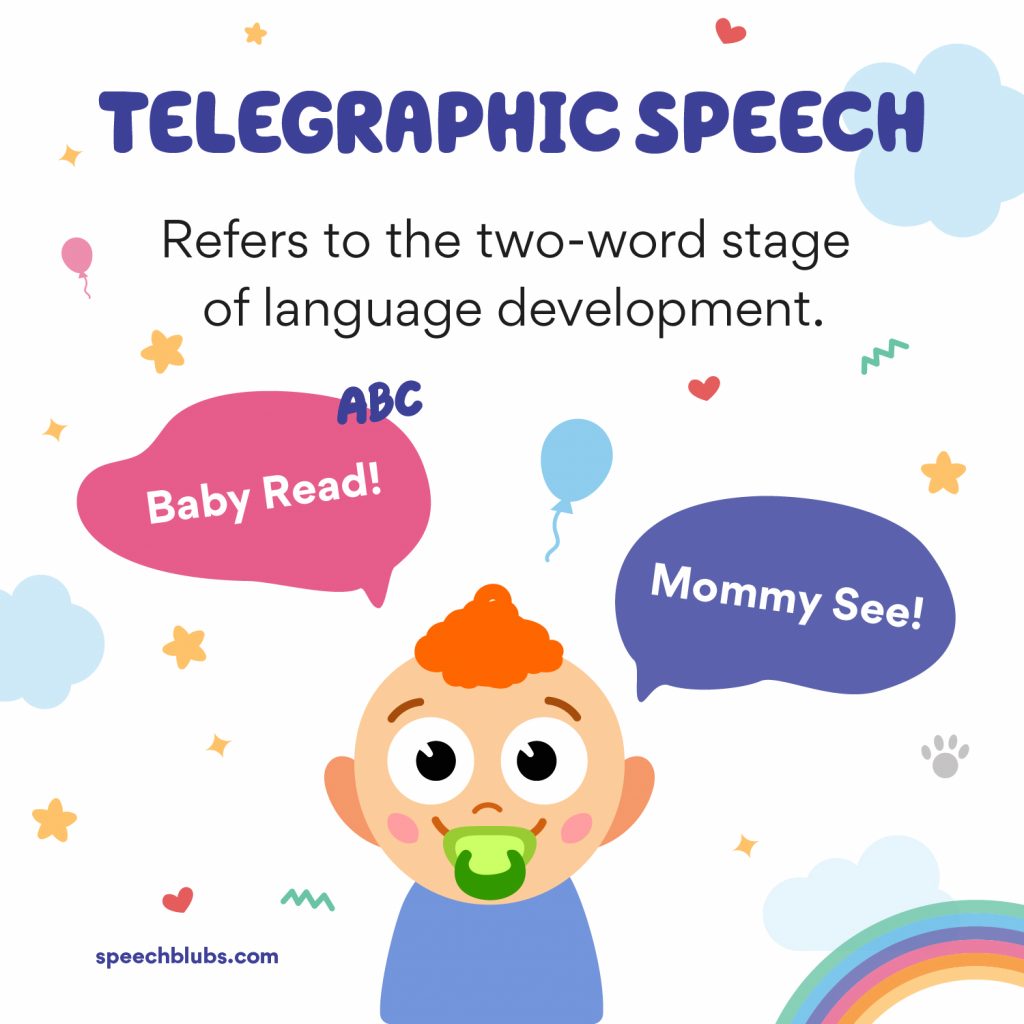
Children need to have a 35-50 word vocabulary that they can use spontaneously before they can begin to combine words. If your child’s vocabulary is not that size, then the first thing you need to do before combining words is to increase their single-word vocabulary. You can do this by using a variety of flash-cards, books, and apps designed for expanding your child’s vocabulary. Speech Blubs includes over 1,500 videos of kids and interactive activities designed just for that.
You might not be sure whether your child’s speech and language development is age-appropriate. Therefore, our free screener is the ideal tool to use for early recognition of language delay. Our report with its actionable steps can guide you on what to do next if you suspect your child has a language delay. If you don’t have the app, you can download the app for iOS and Android devices.
Boost Your Child’s Speech Development!
Improve language & communication skills with fun learning!

Your child’s first word combinations are used to express two ideas using any two words (e.g. “Mommy up” when they want to be held). As your child progresses, their word combinations should start to include verbs, which are very important for their grammar skills to develop.
Additionally, having a vocabulary of words from different grammatical categories is needed for your child to sensibly combine words. Based on this, your child must be able to do the following things in order to successfully combine two words together:
Use a Variety of Words
To combine words and start saying meaningful sentences, your child needs to have a vocabulary that allows them to do so. Children learn nouns first (names of people, places, and things), but in order for them to construct meaningful sentences they need to use:
- Verbs (go, run, jump)
- Adjectives (big, fast, pretty)
- Prepositions (in, on, under)
As they get older, they should also start using:
- Social words (hello, bye-bye, hi)
- Requesting words (please, more, again)
- Early pronouns (me, mine, you)
- Negation (no, can’t, don’t)
Express Two Ideas
Before your child can verbally express two ideas, they need to be able to express two ideas by using a word and a “supplementary gesture.” This nonverbal communication adds additional information to the word that they have spoken. A good example is your child getting your attention by saying “Mommy” or “Daddy” and then pointing to a toy that they can’t reach. Your child’s message has two ideas:
- To get your attention
- To get you to give them their toy
If your child is able to do this, then they are ready to combine two words together verbally.
IMPORTANT! Words like “thank you” and “night, night” don’t count as two-word combinations. They are memorized by your child as a single “chunk” of language that they can’t break up to combine with other words.
Here’s How You Can Help
You will be able to help your child combine words together and move up towards saying full sentences by using the following techniques as much as possible:
Expansion
You can expand your child’s language and demonstrate two-word combinations during a play or flash-card activity by taking the single word that they have said (e.g. “cow”) and adding another word to it (e.g. “brown cow”). When you want to start making your way up to sentences, you can continue to add words to what your child has already said (e.g. “big brown cow,” “the big brown cow,” “the big brown cow is eating”).
Gesture
Use gestures while you speak to help your child understand what you are saying and to show them how they can use gestures and words at the same time. This will encourage them to use “supplementary gestures” that assist with understanding (e.g. “more water?” while you shape your hand like a cup and mime drinking from it).
Choices
You can say two-word combinations to your child when you are giving them a choice between different things. This aids their understanding, and hearing you use two-word combinations will encourage them to make their own two-word combinations (e.g. “more food?” “no food?”). You can then add words onto these combinations to make longer sentences (e.g. “want more food?” “no more food?”).
Emphasis
Emphasize the most important words in your sentences. The best way to do this is to play with your child and emphasize new words that are based on the current activity and their interests. You can do this by using actions and changing your tone of voice to make these new words stand out. This is a good chance for you to model and for your child to copy you, so make sure you highlight a variety of words.
As your child gets older and begins to say longer sentences, you can then emphasize word and sentence boundaries to encourage correct sentence formulation and grammar development.
Hang in there!
If you find your child is struggling or is overwhelmed at first, teach them through categorization and daily routines, as this will assist them with understanding what you are talking about (e.g. If your child can’t remember the names of all animals you are playing with, separate the animals into categories of “farm animals” or “wild animals,” or even “sea animals” and “land animals).
Our app is great for the development of categorization skills, which helps children learn from other kids in a fun way that they find rewarding. If you don’t have the app, you can download the app for iOS and Android devices.
Modeling
Your child’s initial word combinations will lack proper grammar. This is alright, but to help them learn correct grammar to combine more words together, you need to provide your child with models that are grammatically correct. Kids models in Speech Blubs app are a good example.
This will help your child learn how words are used and what they mean (e.g. your child says “Mommy toy” you can say “you want your toy”). You can then add words onto these combinations to make longer sentences (e.g. “you want your fluffy cow toy).
Simple Sentences
Be sure to start off with short, simple sentences when you model for your child. This will ensure that they understand you which makes them more likely to copy you. If your child struggles, you can prompt them as to what to say or even provide a “script” so that you can cue them when to speak.
Additionally, adapt your language input to your child’s level of attention and comprehension. Be specific with your labeling, otherwise, your child will become confused.
If you’d like to find out more about how prompting and cueing is used in speech therapy you can read this article.
Repetition
When it comes to new words and word combinations, your child will need to hear them many times before they will begin to use themselves. Make sure to always respond to your child’s communication attempts and explain why you are correcting what they are saying if they are old enough to understand. Make sure to always provide examples of correct grammar.
Some Fun Activities to Get You Started
You and your child can take turns pretending to be a police officer and tell each other what to do (e.g. “pat head,” “jump up,” “sit down”)
Play a “washing toy” game and encourage your child to choose a toy that they can wash and describe what is being washed while they do it (e.g. “wash face,” “wash legs,” “wash hands”). You can even do this activity with your child during bath time.
Make a “gone box” where you cut a hole in a cardboard box and let your child put objects through it. Your child must name the object as it disappears and say “gone” (e.g. “spoon gone,” “brush gone,” “doll gone”)
Use the words your child already knows and show them how two words can be joined together (e.g. “more” + “food” = “more food,” “pink” + “block” = “pink block,” “Mommy” + “gone” = “Mommy gone”)
Add one word to what your child already said in a spontaneous speech to show them “real-time” two-word combinations which they must then repeat (e.g. Your child says “juice” and you say “want juice” or “you want juice”)
Giving your child two-word combination examples during daily routines is a great way to teach your child how to combine words. Such daily routines include meal times, playing games, getting ready for the day, and bedtime (E.g. “your spoon,” “kick ball,” “brush teeth,” “light off”)
. . . and here are even more!
Encourage your child throughout the day, especially during daily routines and playtime. Try and make him use two words instead of one by asking “what are you doing?” and “what is happening?” You can then help them formulate an appropriate response related to these objects and events. This targets their reasoning and storytelling abilities as well
Ensure that you engage your child in cognitive activities such as building puzzles and reading books. These activities directly correspond to the development of language skills and can help your child progress faster and communicate effectively.
Remember, our free screener is the ideal tool to use for early recognition of language delay. And our report with its actionable steps can guide you on what to do next if you suspect your child has a language delay.
If you don’t have the app, you can download the app for iOS and Android devices. For more information about the app visit our FAQ section or write to us. Know that you have an ally in Speech Blubs! And that our biggest success is seeing your child achieve their greatest potential.
Get started with Speech Blubs
Cancel anytime, hassle-free!
МЕТОДИЧЕСКАЯ РАЗРАБОТКА
УРОКА АНГЛИЙСКОГО ЯЗЫКА ДЛЯ УЧАЩИХСЯ 8 КЛАССА
по теме «Video and computer games.»
учитель английского языка МОУ «СОШ № 103» г. Саратова
Смолякова Светлана Николаевна
ТЕМА: Video and computer games
ЦЕЛИ:
ПОЗНАВАТЕЛЬНЫЙ АСПЕКТ:
Знакомство положительными и отрицательными сторонами электронных игр. Формирование социо-культурной компетенции.
ВОСПИТАТЕЛЬНЫЙ АСПЕКТ:
Воспитание правильного отношения к многообразию виртуального мира.
РАЗВИВАЮЩИЙ АСПЕКТ:
Развитие памяти, мышления, логики, внимания, умения анализировать, сопоставлять, делать выводы. Развитие речевого аппарата, слуха. Развитие внутренней мотивации учащихся.
ПРАКТИЧЕСКИЙ АСПЕКТ:
Обучение аудированию и монологической речи, обучение чтению.
Сопутствующая задача: ознакомление и отработка лексики по теме “Video and computer games”.
РЕЧЕВОЙ МАТЕРИАЛ:
Лексический: to gain popularity, to develop memory, logical thinking, to make virtual friends, way of entertainment, affect in many ways, harmful effect on health, to spoil eye sight, an addiction, to make cruel, to cause violent behaviour, violent, a mystery, to provide, a skill, an official, sale, card game, violence, a secret agent, an expert,
an increase.
Грамматический: The Present Simple Tense, Passive Voice, articles.
ОБОРУДОВАНИЕ:
Доска, магнитофон, аудио кассета, компьютер, мульти-медийный проектор, раздаточный материал, мультимедийная презентация.
УЧЕБНЫЕ ПОСОБИЯ:
учебник для VII класса школ с углубленным изучением английского языка, лицеев и гимназий./О.В.Афанасьева, И.В.Михеева — Москва, Просвещение, 2010.
Электронное пособие American Potpourri- English Language Office, U.S.Embassy, Moscow, 2009.
ХОД УРОКА:
Организационный этап (приветствие, введение в тему, задачи урока)
Беседа о роли компьютера и компьютерных игр.
Введение и первичная отработка лексики по теме урока.
Чтение текста (задание на соответствие, задание на подстановку)
Монологические высказывания учащихся о пользе и вреде компьютерных игр по плану (сиквейн), высказывание собственного мнения.
Обучение аудированию (подготовка к прослушиванию).
Заключительный этап. Подведение итогов, выставление и комментирование оценок. Домашнее задание.
Ход урока
Организационный этап
Greeting
— Hello! I’m glad to see you dear friends! We also welcome our guests. Let’s begin, we have plenty of work to do.
Performing and discussing the topic of the lesson.
— We’ll see now what the topic of our lesson today is. Here you are. I think it won’t be difficult for you to guess the topic of our lesson.
Ps – computer games.
Yes, you’re quite right. It’s Video and computer games. The topic is very interesting and I hope that you will participate in the conversation enthusiastically and show excellent results.
Answer the questions, please.
Do you like playing computer games?
How many hours a day do you devote to playing?
What do you think computer games are: fun or useless occupation?
Well, the objectives of the lesson are:
To read about computer games;
To figure out the pros and the corns;
To develop listening and conversation skills;
To learn to express personal attitude towards the problem.
Введение и первичная отработка лексики по теме урока.
Match the word-combinations and their meaning:
|
to gain popularity to develop memory logical thinking to make virtual friends way of entertainment affect in many ways harmful effect on health to spoil eye sight an addiction to make cruel to cause violent behaviour. violent |
Быть причиной жестокого поведения Пагубная привычка, пристрастие Приобретать популярность Знакомиться с возможными друзьями Способ развлечься Развивать память Влиять различным образом Пагубное влияние на здоровье Портить зрение Делать жестоким K) Логическое мышление L) Жестокий |
Keys: 1-C, 2-F, 3-K, 4-D, 5-E, 6-G, 7-H, 8-I, 9-B, 10-J, 11-A.
Make up sentences.
— develop memory, logical thinking, games, and computer.
— may, unfortunately, harmful effect, have, they, on, health.
— too, much, computer, playing, is, game, no, good.
Fill in the appropriate word combination:
( friends, violent, harmful, addiction, develop memory, great way)
Computer games (1)… …, because you try to remember all details. You can make (2) … …, so it is another way of communication. Unfortunately, many computer and video games are very (3)…, and research shows that this violence can affect kids in many ways.
Computer games have a (4) … effect on health. Game playing is like an (5) … to some people, which means they don’t learn well at school, don’t communicate! The problem has as many strong points as well as weak ones. Computer games are a (6)… … to learn how to do things.
Чтение текста.
On your desks you have copies of the text “The pros and the corns of computer games”. You have 2 minutes to read it to yourselves and say what is the main idea of it? (choose between two ideas)
A .Computer games are gaining more popularity nowadays.
B. Playing PC games have as many positives as negatives.
2. Now read the text again and find the pros and the corns of computer games.
Let’s see what you have found.
IV. Монологические высказывания
1. If you look at the screen now you will find two plans of our further discussion:
In groups make reports proving that….
|
Computer games Popular, entertaining, helpful Develop memory, make friends, help tostudy A way of communication, entertainment. |
Computer games Violent, harmful Affect in many ways, spoil health(eyesight), An addiction to, cause violent behaviour. |
2. Good job! What do you, personally think of computer games?
Ps give different opinions.
A plan:
1. Computer games in the modern world.
2. The “positives” of playing computer.
3. The “negatives” of playing computer.
V. Pre-listening activities. Vocabulary study.
|
a mystery to provide a skill an official sale card game violence a secret agent expert an increase |
a riddle to serve, to deliver experience, ability, practice clerk selling cards, poker aggression a spy specialist growth |
загадка предоставлять навык должностное лицо распродажа карточная игра жестокость секретный агент эксперт рост |
Обучение аудированию. Listening.
I suppose it is always interesting to know smth about other countries and people. Let’s play a guessing game first.
Computer games are played by … of Americans.
a) billions b)millions c)thousands
2. James Bond was the most famous secret … in the world.
a) spy b)lover c)agent
3. Many people are fond of … games especially poker.
a) board b)card c)role-play
4. PC games can be a way to learn how to direct you ….
a) effort b)thought c)strength
5. Some colleges in America teach students to … electronic games.
a) create b)play c)design
KEYS: 1-b, 2-c, 3-b, 4-b, 5-c.
You will hear a radio programme about PC games in America.
Listen and check your guesses. Great!
2. Listen again and choose the right answer. You have two minutes to read them to yourselves.
Why are PC games so popular?
a) PC games provide fun and educate people.
b) Gamers play because there is a lot of violence in games.
c) People like sports
2. How can computer games be harmful?
a) Games may take too much time.
b) Some games are too violent.
c) They are harmful for the eyes.
3. Prove that video games are attracting more and more people.
a) More games are sold every year.
b) Games are getting cheaper.
c) The number of games increased last year.
KEYS: 1-a, 2-b, 3-a.
VII. Подведение итогов, выставление оценок, домашнее задание, окончание урока
— Well, you’ve worked hard at the lesson and showed very good results and deep knowledge. So your marks are:
— Here is your home assignment: write a description of your favourite computer game.
— The lesson is over. Thank you for good work. Bye!
Описание и ответ задания[править | править код]
Read the text again for more detailed information and find in it words and word combinations which mean:
- original Olympic Games – первые (впервые появившиеся) Олимпийские игры
- in the early Christian era (a.d) – в начале христианской эры (нашей эры)
- the Games were renewed – игры были возобновлены
- a way of saluting their gods – способ чествовать своих богов
- a manner of saluting he athletic talents – способ прославить спортивные таланты
- on which the modern Olympic movement is based – на которой основывается современное олимпийское движение
- in honour of Zeus – в честь Зевса
- a footrace – состязание в беге
- warlike Spartans – воинственные спартанцы
- wrestling, pentathlon, chariot race – борьба, пятиборье, гонки на колесницах
- to bring the Olympic Games back to life – вернуть Олимпийские игры к жизни
- supported his idea – поддержали его идею
- the right place to host the first Olympic Games – самое подходящее место для проведения первых Олимпийских игр
- Olympics are governed by the International Olympic Comitet (IOC) – Олимпиады проводятся под руководством Международного олимпийского комитета (МОК).


